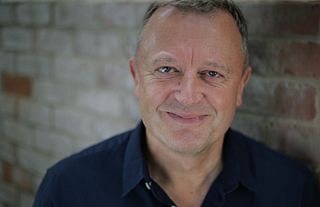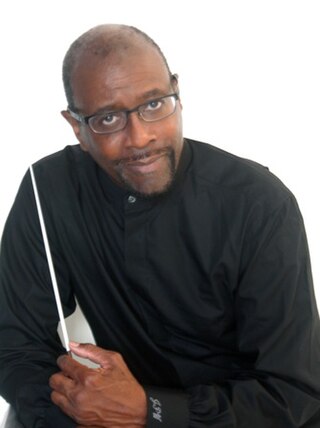
David Conte is an American composer who has written over 150 works published by E.C. Schirmer, including six operas, a musical, works for chorus, solo voice, orchestra, chamber music, organ, piano, guitar, and harp. Conte has received commissions from Chanticleer, the San Francisco Symphony Chorus, Harvard University Chorus, the Men’s Glee Clubs of Cornell University and the University of Notre Dame, GALA Choruses from the cities of San Francisco, New York, Boston, Atlanta, Seattle, and Washington, D.C., the Dayton Philharmonic, the Oakland Symphony, the Stockton Symphony, the Atlantic Classical Orchestra, the American Guild of Organists, Sonoma City Opera, and the Gerbode Foundation. He was honored with the American Choral Directors Association (ACDA) Brock Commission in 2007 for his work The Nine Muses, and in 2016 he won the National Association of Teachers of Singing (NATS) Art Song Composition Award for his work American Death Ballads.

John Milford Rutter is an English composer, conductor, editor, arranger, and record producer, mainly of choral music.

Patrick Hawes is a British composer, conductor, organist and pianist.
Kentaro Sato, aka Ken-P, is a composer/conductor/orchestrator/clinician of media music (Film/TV/Game) and concert music. His works have been broadcast, performed, and recorded in North and South America, Asia, and Europe by well-known groups including the London Symphony Orchestra, Philharmonia Orchestra and Sydney Symphony Orchestra. In 2005, he was appointed a resident composer/assistant conductor of the Torrance Symphony. He is also a frequent guest conductor and lecturer for various workshops and reading sessions on choral music and composition/orchestration around the world.
Patrick Larley is a British composer.
Paul Drayton is a British composer, conductor, pianist, and teacher.

Michael McGlynn is an Irish composer, producer, director, and founder of the vocal ensemble Anúna.

Bradley Ellingboe is an American composer, conductor, and bass-baritone singer.
James B. Furman was an American composer and college professor.
Most of Johann Sebastian Bach's extant church music in Latin—settings of the Mass ordinary and of the Magnificat canticle—dates from his Leipzig period (1723–50). Bach started to assimilate and expand compositions on a Latin text by other composers before his tenure as Thomaskantor in Leipzig, and he continued to do so after he had taken up that post. The text of some of these examples by other composers was a mixture of German and Latin: also Bach contributed a few works employing both languages in the same composition, for example his early Kyrie "Christe, du Lamm Gottes".

Julius Penson Williams, is an American composer, conductor, and college professor. He is currently president of the Conductors Guild. An author of both instrumental and vocal music, Julius Williams has composed operas, symphonies, and chorus works for stage, concert hall, film, and television. Primarily a classically trained musician, Williams also writes in genres including gospel, jazz, and other contemporary forms.
Zane Randall Stroope is an American composer and conductor. He has published more than 190 works, with: Oxford University Press, Carl Fischer, Alliance Music Publishing, Walton, Colla Voce, and Lorenz.

James Burton is a British conductor and composer. He is currently the Boston Symphony Orchestra Choral Director and Conductor of the Tanglewood Festival Chorus. He also holds the position of Director of Orchestral Activities and Master Lecturer in Music at Boston University.
Steven Sametz is active as both conductor and composer. He has been hailed as "one of the most respected choral composers in America." Since 1979, he has been on the faculty of Lehigh University in Bethlehem, Pennsylvania, where he holds the Ronald J. Ulrich Chair in Music and is Director of Choral Activities and is founding director of the Lehigh University Choral Union. Since 1998, he has served as Artistic Director of the professional a cappella ensemble, The Princeton Singers. He is also the founding director of the Lehigh University Summer Choral Composers’ Forum. In 2012, he was named Chair of the American Choral Directors Association Composition Advisory Committee.

Antonio Vivaldi made several versions of his G minor setting of the Magnificat canticle. He scored his best known version, RV 610, for vocal soloists, four-part choir, oboes and string orchestra, which also exists in a version for two groups of performers. He based these versions on an earlier setting for voices and strings only (RV 610b). His ultimate version, in which some choral and ensemble movements are replaced by five arias, to be sung a cappella by girls from the Ospedale della Pietà orphanage, was catalogued as RV 611. The concise work is well suited for use in vesper services.

The Magnificat by John Rutter is a musical setting of the biblical canticle Magnificat, completed in 1990. The extended composition in seven movements "for soprano or mezzo-soprano solo, mixed choir, and orchestra " is based on the Latin text, interspersed with "Of a Rose, a lovely Rose", an anonymous English poem on Marian themes, the beginning of the Sanctus and a prayer to Mary. The music includes elements of Latin American music.
André Jerome Thomas is an American composer and conductor. He served as a professor of music at the College of Music at Florida State University and the artistic director for the Tallahassee Community Chorus. In addition to his conducting and composition credits, Thomas is a published author, having written Way Over in Beulah Lan': Understanding and Performing the Negro Spiritual, and numerous journal articles.
Jake Runestad is an American composer and conductor of classical music based in Minneapolis, Minnesota. He has composed music for a wide variety of musical genres and ensembles, but has achieved greatest acclaim for his work in the genres of opera, orchestral music, choral music, and wind ensemble. One of his principal collaborators for musical texts has been Todd Boss.

Te Deum is a sacred choral composition by Karl Jenkins, written in 2008. It is an extended setting of the Te Deum in Latin. Te Deum is often performed together with the composer's Gloria.

Scott Gendel is an American composer, pianist, and vocal coach. Gendel is known mostly for his art songs and choral music, but has also written numerous operas and musical theatre works, as well as orchestral and chamber music.










